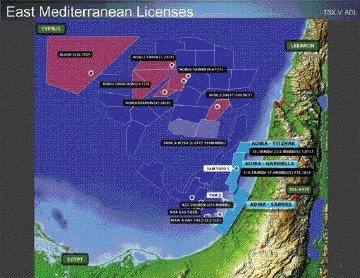
Over the past five years and aside from Egypt’s well-established credentials, the Eastern Mediterranean has been transformed as an offshore hydrocarbons province, largely down to the persistence of one company.
To date, US independent Noble Energy has located some 35trillion cu.ft of gas resources across six discoveries of which two have been made in the last few months.
Five of the finds are offshore Israel. However, late 2011 saw Noble make history by making a large gas discovery offshore Cyprus with initial reserves estimated at 7TCF.
The block 12, Cyprus-A well encountered some 94.5m (310ft) of net natural gas pay in multiple high-quality Miocene sand intervals.
The discovery well was drilled to a depth of 5,860m (19,225ft) in a water depth of about 1,690m (5,540ft). Results from drilling, formation logs and initial evaluation work indicate an estimated gross resource range of 5-8TCF, with a gross mean of 7TCF.
The Cyprus Block 12 field, appropriately named Aphrodite, covers just over 100sq.km (about 40 square miles) and will require additional appraisal drilling prior to development.
Breaking the news, Noble Energy’s Chairman and CEO, Charles Davidson, said: “This is the fifth consecutive natural gas field discovery for Noble Energy and our partners in the greater Levant basin.
“This latest discovery in Cyprus further highlights the quality and significance of this world-class basin.”
Noble operates the Cyprus concession with a 70% interest.
Not to be outdone, Turkish national oil company TPAO is also bent on finding hydrocarbons offshore in the Turkish-controlled part of the Cypriot aquatory.
It was reported mid-March that final preparations to spud an exploration well were being made. It was predicted that Eastern Mediterranean tensions might heat up as a result of the exploration, bearing in mind that Cyprus is a divided island with control split between Greece and Turkey.
Indeed TPAO’s chairman and president, Mehmet Uysal, warned in mid-March, saying: “We are to start drilling off northern Cyprus in the coming days. We have already shipped equipment there and are ready to begin work.
“If there is a need to drill in areas where licences clash, we will take all measures.”
To complicate matters further, in February, Cyprus launched its second licensing round with 12 blocks on offer. Expectation is that companies will be most interested in acreage close to the maritime boundaries with Israel and Lebanon.
However, the clear leader in the region is Israel, thanks to Noble, which has transformed the Jewish state’s energy fortunes. That said, Jerusalem’s edgy relationship with neighbour Lebanon means that more than 850sq.km of aquatory is in contention.
Beirut argues its version of where the boundary should lie is in line with an armistice accord drawn up in 1949, an agreement which is not contested by Israel. Pressure is now mounting for a resolution through the United Nations.
Lebanon has been slow to exploit its maritime resources compared with its neighbours and, while the lack of satisfactory boundary arrangements is acting as a drag, it does not preclude offshore exploration.
Meanwhile, Israel occupies centre-stage and Noble is the star. The company described three of its finds as world class. Most focus is currently on the Tamar and Leviathan developments.
Tamar is moving ahead on an “accelerated timeline”. The gross resource is estimated at 9TCF and 2.8TCF net to Noble, which has a 2.8TCF share based on its 36% working interest in the find.
Noble told analysts in February that development was progressing, with platform topsides, jacket construction and pipelay work 50% complete. Expansion of an existing gas receiving terminal onshore was also in hand.
The plan is for commissioning to start late this year with first gas sales under an initial 15-year agreement expected in April 2013. If all goes to plan, Noble will have achieved first commercial production from Tamar just four years from discovery and 2.5 years from sanction.
Turning to Leviathan, the reserves of which are estimated at 17TCF (6TCF gross to Noble), successful appraisal work means that reservoir characteristics are now better understood and, crucially, the boundary between the gas reservoir and underlying aquifer has been located.
Noble has reported that project and commercial teams are in place and that screening of field development concepts is under way.
There is also a plan to re-enter the Leviathan-1 well to test a deep play concept. If this works out then Noble expects to find additional hydrocarbons.
In its February analysts session, Noble claimed that its existing Mari-B field continued to deliver gas to shore and that the Noa satellite development was “moving ahead”.
The company made no mention in its website presentation that Mari-B was in trouble. News broke in the Israeli media last month that the seafloor was sinking and that the state’s Ministry of Energy and Water Resources had secretly hired a global consultancy firm . . . RPS . . . to assess the gas production platform’s safety, though Noble has claimed there was no immediate danger.
According to Noble, the rig will sink as the natural gas reservoir beneath is depleted, but the rate of sinking in recent months has been faster than expected. Such problems, while hardly common, are not unknown. The most spectacular example is the Ekofisk field in the Norwegian sector of the North Sea where the oil reservoir is chalk rather than sands.
Israeli media have reported that gas is also seeping into the sea through cracks in the strata near the Mari-B platform.
According to the Globes news service: “The rig’s rapid sinking and the gas seepage has already caused instability in the production wells, rendering some of them useless. Noble Energy staff told Petroleum Department officials that there was no immediate risk to the production platform.”
The Mari B installation is due to play important roles in the future as it will be used as a transit point for gas exports from Tamar.